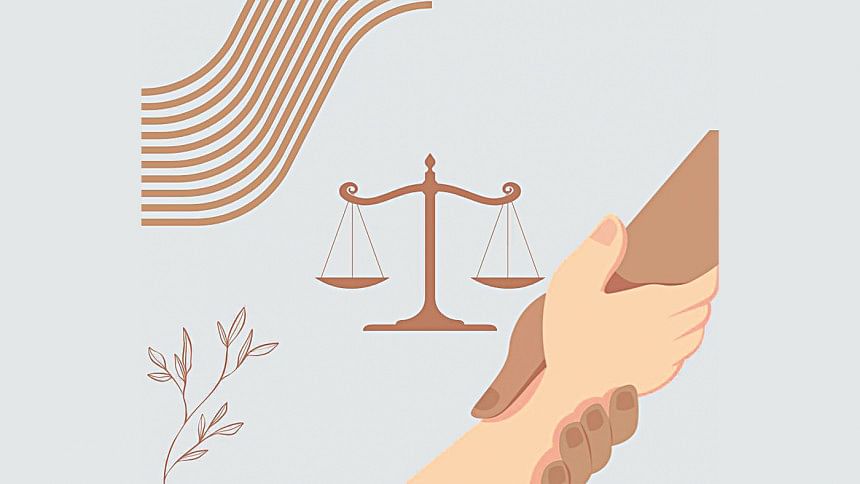Legal aid in upholding women’s rights

Article 27 of the Constitution of the People's Republic of Bangladesh enshrines the right to equal protection of the law. In consonance with such affirmation, the Legal Aid Services Act 2000 (hereinafter LASA) was enacted to provide legal aid to the litigants, who are incapable of seeking justice due to financial insolvency, destitution, helplessness, and various socio-economic stratification. District Legal Aid Office (hereinafter DLAO) is a government statutory body that provides legal aid to impoverished people under the National Legal Aid Services Organisation (NLASO).
The right to receive dower is a right of every Muslim woman connected with her marriage. Unfortunately, this financial right of women has been turned into a mere symbolic gesture due to patriarchal subversions. The authority to pronounce "no-fault" unilateral divorce of husbands often brings an abundance of woe to disadvantaged women. The limitation period for recovery of the dower is three years from when the claim for dower was first refused to be paid in case of prompt dower (or where no such demand was made during the continuance of marriage, from when the marriage is dissolved by death or divorce) and from when the marriage is dissolved by death or divorce in case of deferred dower (Article 103, 104 of the Limitation Act, 1908).
Apart from dower, in case of divorce, the wife is entitled to maintenance of three months' iddat period. Gendered power disparity coupled with financial constraints compels many women to accept more dismissals and ex parte decrees that impinge on the quality of justice they receive from family courts. There is a plethora of literature on how the backlog of cases in formal courts, gender stereotypes, and societal pressure impede women from accessing justice.
In such a situation, DLAO offers a drizzle of hope. DLAO provides a gender-sensitive environment where women can file applications and after assessing the scenario, DLAO sends notice to the other party. It is pertinent to mention that District Legal Aid Officers do not provide any judgment and their role resembles that of an impartial third-party mediator. However, the settlement contract drawn by both parties in the presence of respective Legal Aid Officers is binding. It is easier to reach a common ground through negotiations which might take years to get resolved in formal judicial procedure. In cases involving dowry-induced violence and other forms of domestic violence, legal proceedings are encouraged, and free-of-cost legal assistance is provided as well.
Some gender-sensitive data from the DLAO, Chattogram, will shed more light on the scenario. A bulk portion of applications received in the concerned DLAO is essentially family disputes. In the preceding year, 433 cases were disposed of with the assistance of the Chattogram legal aid office. 456 criminal applications were received under pre-case Alternative Dispute Resolution of which 76 reached settlement and 115 applications are in progress. In such applications, 85 women were beneficiaries. 445 applications were received on family disputes of which 119 reached settlement and 240 applications are ongoing. The office disburses legal aid funds to prospective recipients based on their application. In the earlier year, 845 female applicants were referred to the panel lawyers. 42 women received legal consultation from the DLAO, Chattogram. An approximate amount of TK. 1,20,00,000 was recovered as dower by the said DLAO.
DLAOs across the country can take measures to ensure that wronged women are not deprived of their Shariah and statutory rights. What takes years of litigation through the formal judicial procedure, can be mediated in a couple of mediation sessions in DLAO. The accelerated dower recovery process is indeed a beacon of hope for women left destitute following unilateral divorce.
The authors are (Senior Assistant Judge) District Legal Aid Officer, Chattogram and intern, district legal aid office, Chattogram, respectively.

 For all latest news, follow The Daily Star's Google News channel.
For all latest news, follow The Daily Star's Google News channel. 



Comments